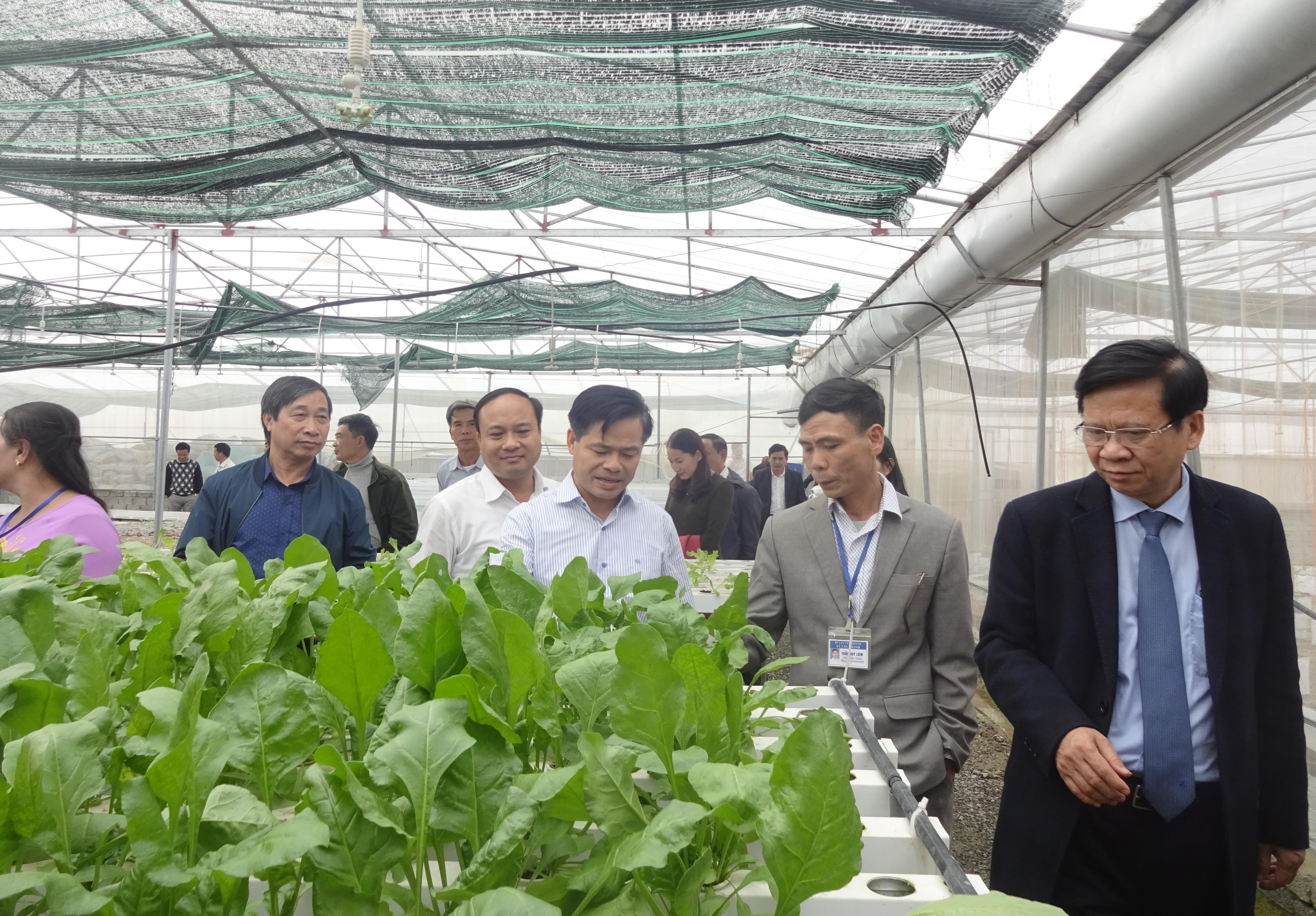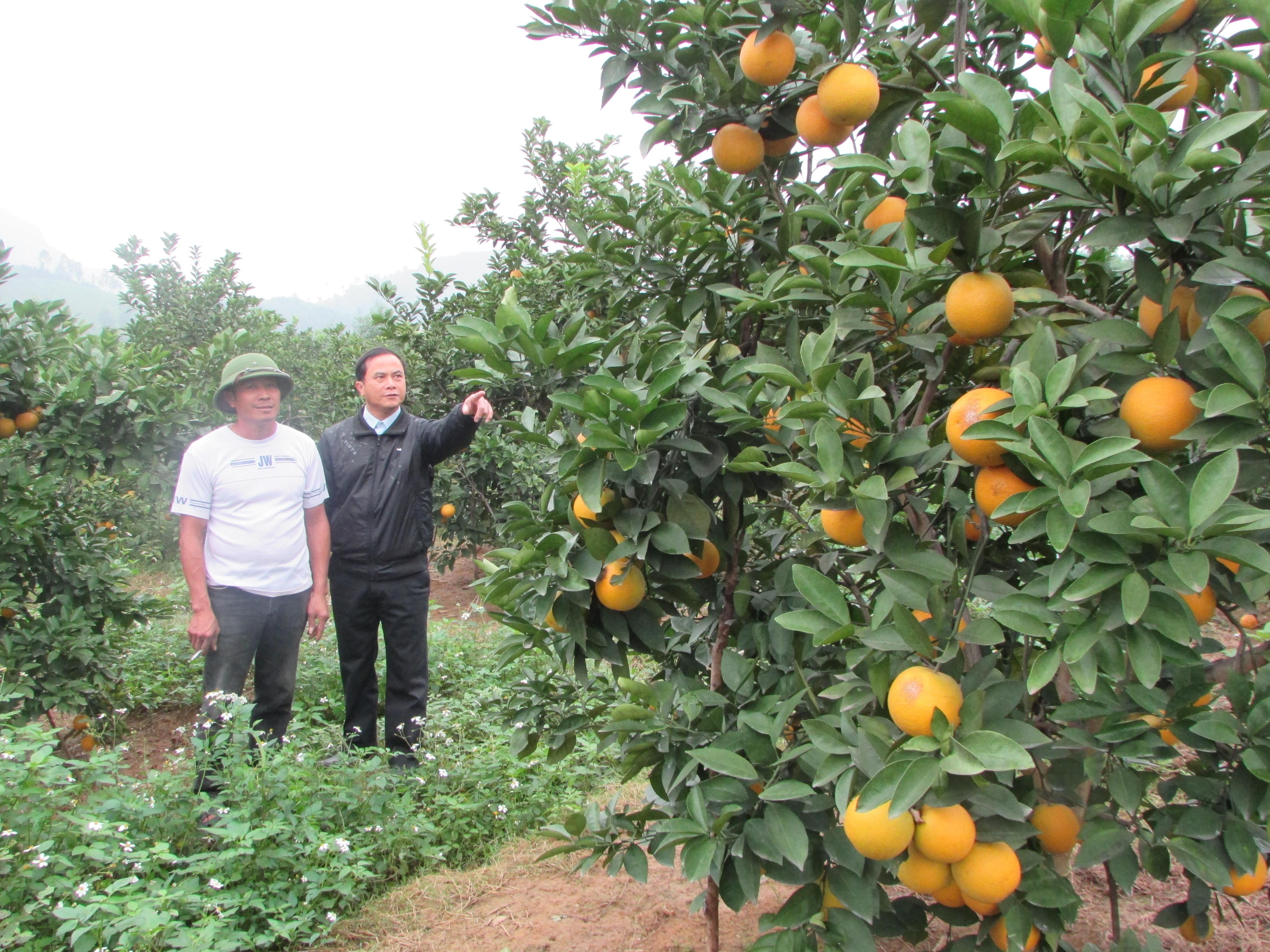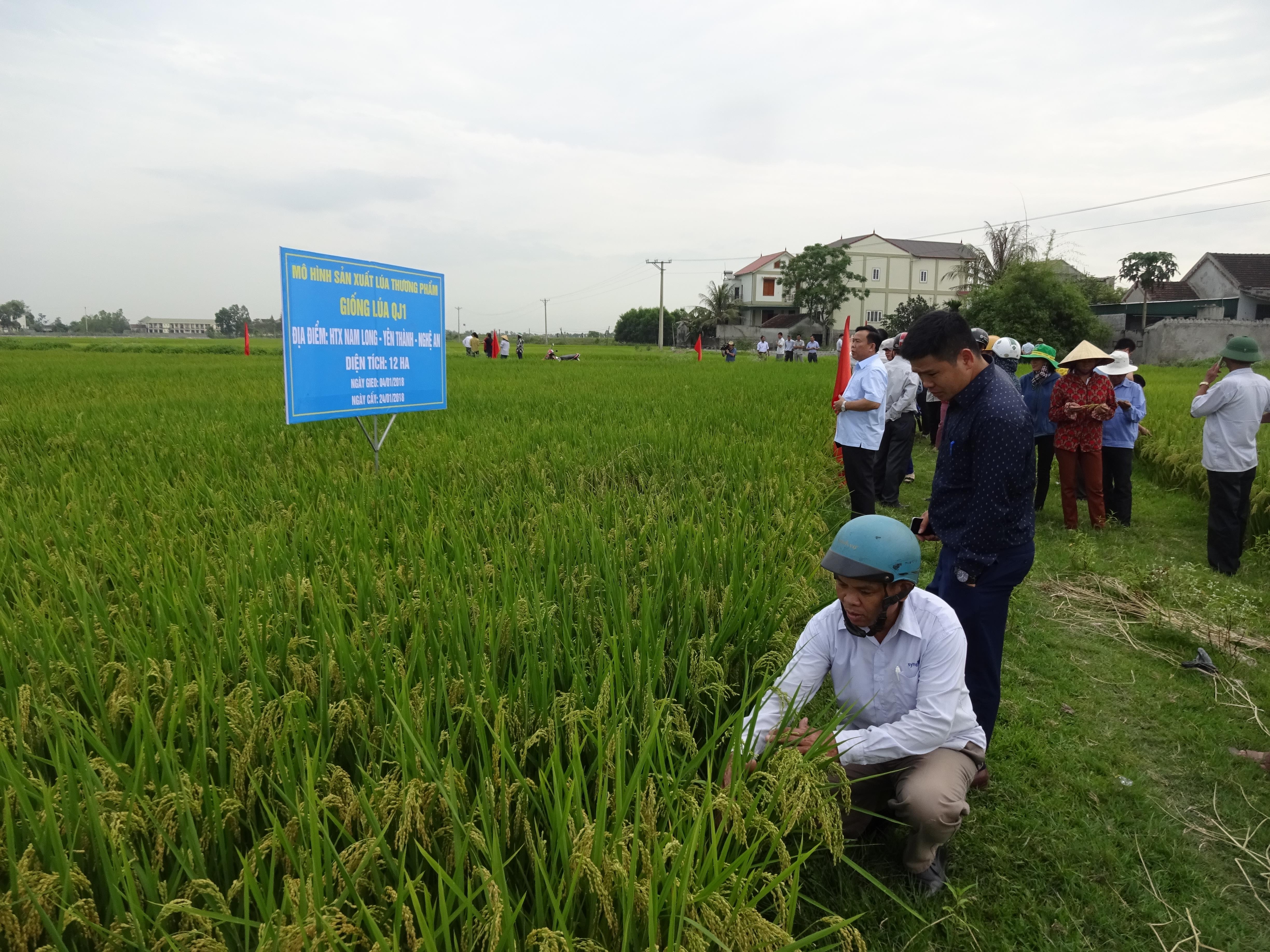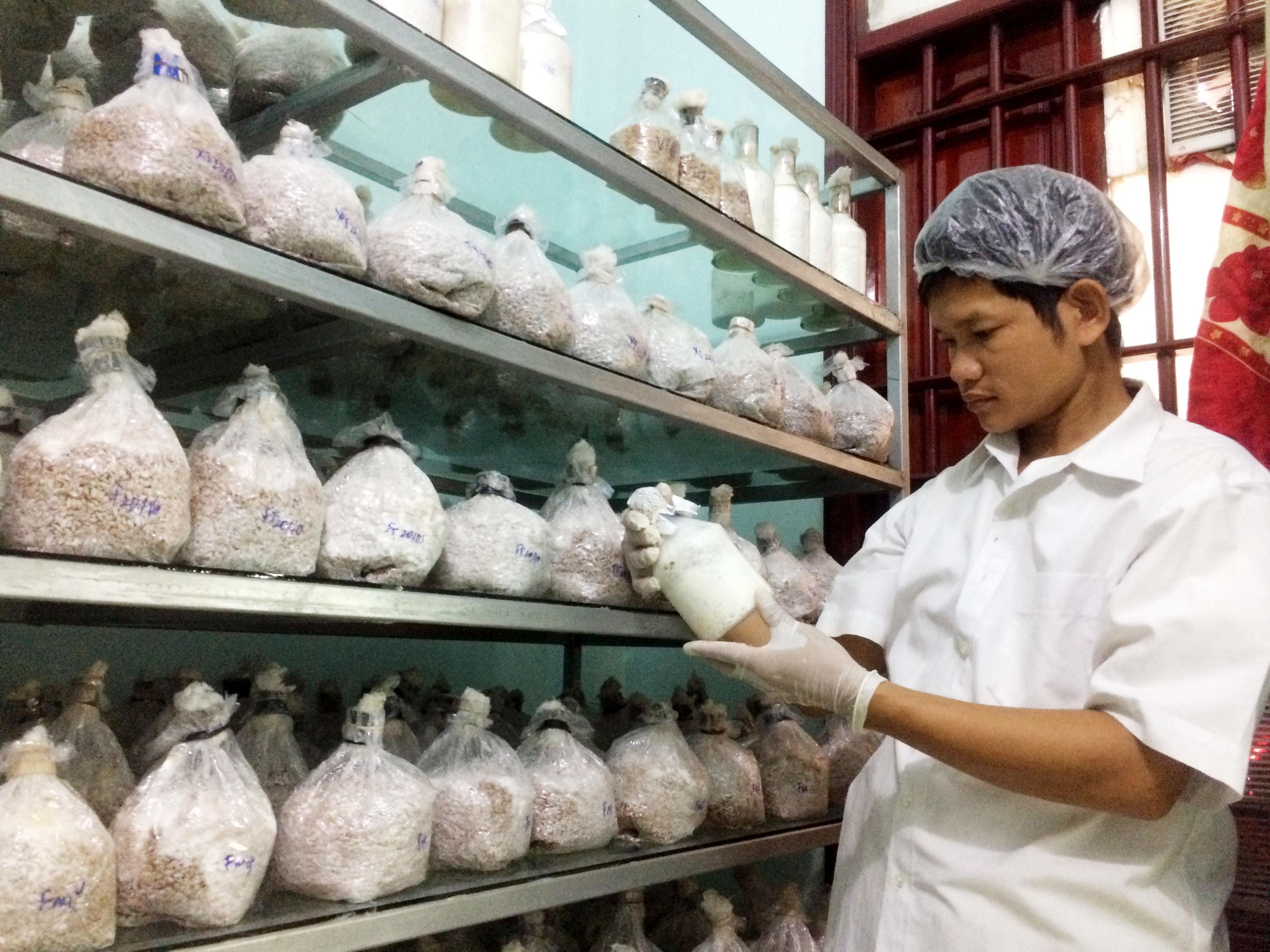Yen Thanh builds 15 high-tech agricultural production models
(Baonghean) - As a key agricultural area of the province, Yen Thanh district always faces many natural disasters, droughts, floods and pests. Faced with that reality, in recent years, people have boldly applied high-tech agriculture to production and achieved initial results.
All beginnings are hard
A typical example is the biosafety mushroom production facility of Mr. Phan Van Linh in Hamlet 4, Yen Thanh Town. While still a student of Agriculture at Vinh University, Phan Van Linh was one of 10 excellent students sent to do an internship in Israel, under a joint training program between universities. During 10 months, he was exposed to developed agriculture, especially in-depth research on microbiological tissue culture. In 2011, after graduating from university, Mr. Linh decided to return to his hometown to start a business.
 |
High-tech clean vegetable growing model of Mr. Tran Duy Trung, Tan Thanh commune (Yen Thanh). Photo: Thai Duong |
“Compared to Israel, a country with a developed agricultural sector, we have many advantages in terms of land potential, labor and raw materials for mushroom production. If people have knowledge, technology, techniques and know how to overcome difficulties, they can apply it successfully,” said Mr. Phan Van Linh.
Despite many failures, with all his heart and passion, for the past 4 years, Mr. Phan Van Linh's facility has successfully produced many types of mushroom seeds, supplying the market with an average of 2.7 tons of various types of seeds each year, and at the same time purchasing all mushroom products for associated facilities, contributing to the Yen Thanh straw mushroom brand.
Not stopping there, in 2017, Mr. Linh successfully researched and produced cordyceps sinensis in an artificial environment, a precious medicinal herb that is currently popular in domestic and foreign markets.
 |
Farmers in Dong Thanh commune (Yen Thanh) apply agricultural technology to grow commercial oranges. Photo: Thai Duong |
Mr. Sendo Shohei - Coordinator of the Japanese JICA project on technical cooperation and agricultural development in Nghe An province affirmed: “We highly appreciate this model, especially for cordyceps, currently in Japan the cultivation rate is only at a low level. On the project side, JICA will provide additional support on new scientific and technological advances in cultivating mushroom seeds, as well as help Yen Thanh people develop sustainable mushroom cultivation. This is one of the products in the clean agricultural sector that JICA is promoting in Nghe An”.
Yen Thanh district has a total production land area of nearly 17,000 hectares, 87% of the population is engaged in agriculture and has a lot of experience in intensive production. Not satisfied with the rice yield of 160 thousand tons/year, Yen Thanh farmers have considered getting rich from high-tech agricultural production, in which rice is one of the main products.
 |
High-tech intensive farming model of QJ1 rice variety in Long Thanh commune (Yen Thanh). Photo: Thai Duong |
Since the 2018 spring crop, Yen Thanh district has cooperated with TH Group to expand the production area of high-quality rice QJ1 to nearly 1,000 hectares in 12 communes. This is a new rice variety, the rice grains meet all quality standards, and are the raw materials for processing products such as rice milk, confectionery and high-quality commercial rice for domestic use and export.
Many challenges to overcome
In fact, like many other localities, high-tech production still has certain limitations, gaps and barriers. That is, people mainly focus on applying scientific and technological advances, but there are not many products applied according to the value chain, lacking sustainability. On the other hand, issues of policy, funding, quality of human resources, especially the output market for products still have many difficulties and shortcomings...
According to Mr. Phan Van Hoa - Director of Vinh Hoa Science and Technology Company Limited, currently the level of people is still limited, they do not fully understand high-tech agriculture. Therefore, when applying in practice, people need to have thinking, creativity, and mastery of science and technology in the fields. The reality also shows that many localities are not really interested in high-tech agricultural production, so the goal of increasing income for people on cultivated areas is still limited.
 |
Mr. Phan Van Linh in Yen Thanh town successfully produces many types of mushroom seeds to serve the mushroom growing needs in and outside the district. Photo: Thai Duong |
The model of growing vegetables, tubers and fruits in greenhouses of Ms. Ha Thi Suong in Bac Xuan hamlet, Hong Thanh commune is also an example. These are the first 3 models in Yen Thanh district to apply high technology to clean vegetable production.
Despite the large investment in building a greenhouse area of 2,000m2, she herself also learned, researched and applied scientific and technological advances to break the habit of fragmented and small-scale production. However, after 1 year of production, this model has encountered many obstacles, the biggest of which is that the output for the product is still slow due to the lack of linkage in production. Another reason is that people cannot distinguish between clean and high-quality products, and when they see a slightly higher price, they do not want to buy.
Mr. Nguyen Vuong Ngoc - Vice Chairman of Yen Thanh District People's Committee said: Currently, in the district, there are 15 agricultural production models applying high technology according to the commodity value chain. The exciting thing is that 13 companies and enterprises have entered the area to sign production and product consumption contracts for the people. In order for science and technology to play a lever role in production, in addition to policy mechanisms, Yen Thanh also focuses on research and development activities, bringing scientific and technological advances to farmers, helping them change traditional agricultural practices. This connection will be the driving force for businesses and farmers to work together and build their homeland.
